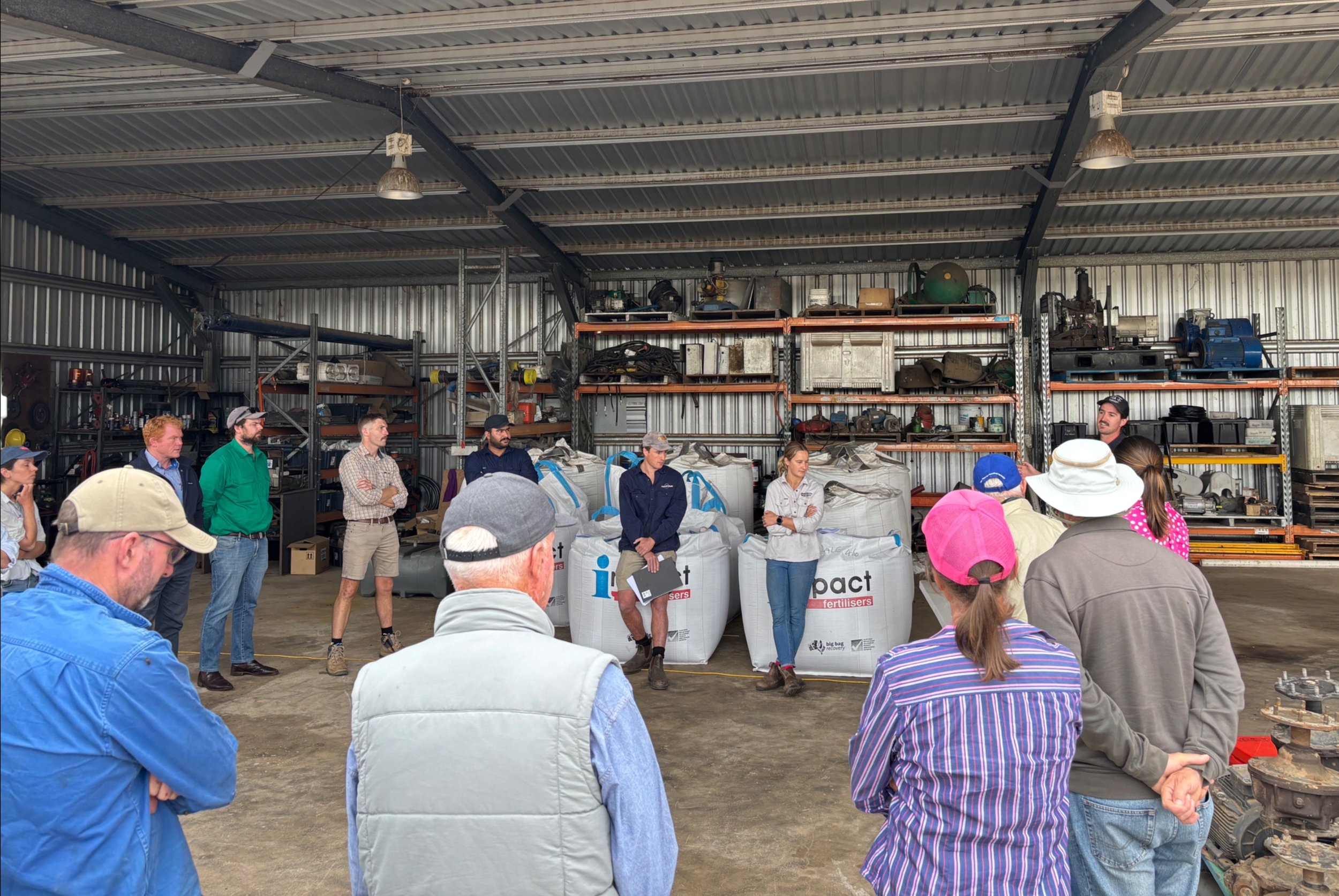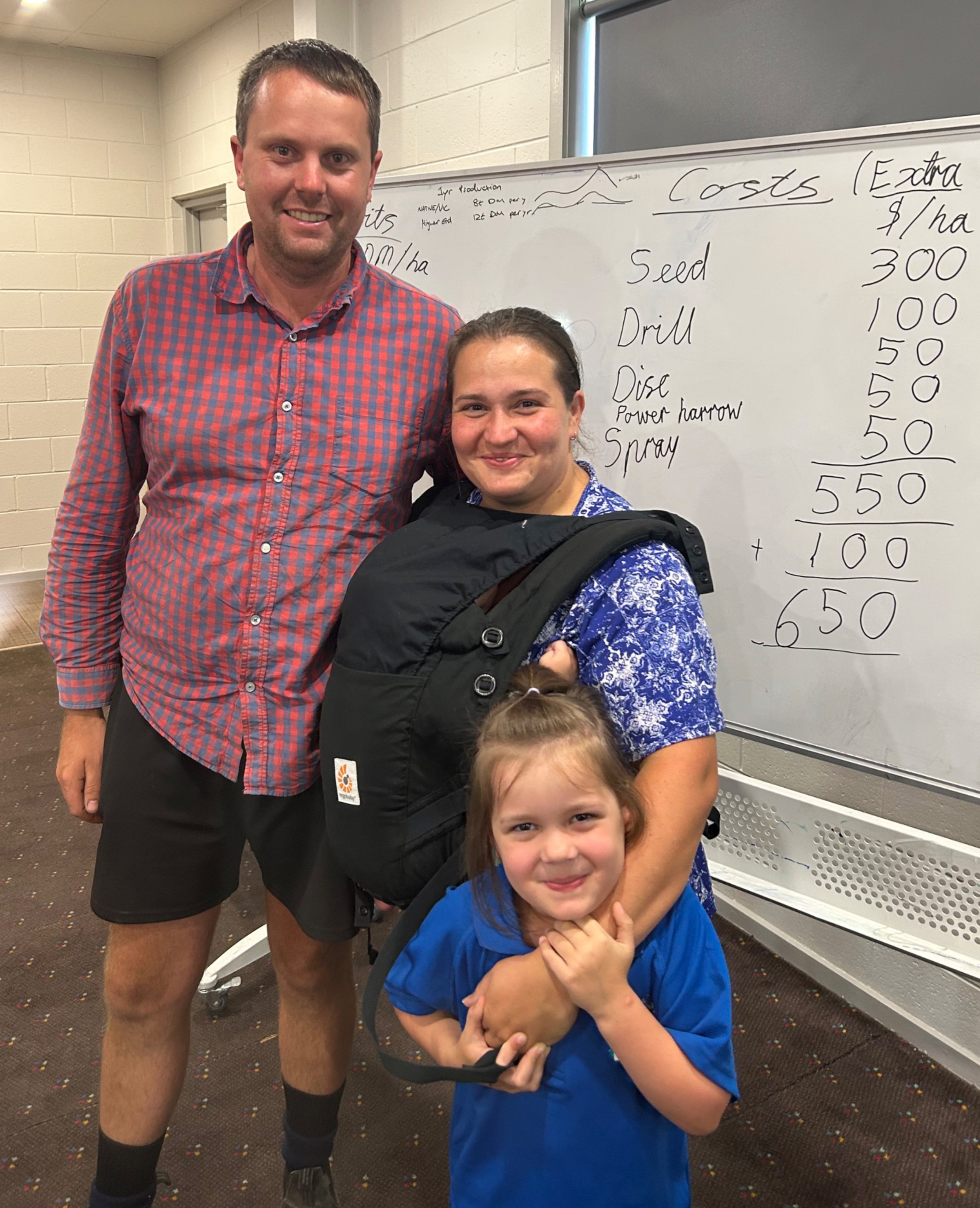February NEWSLETTER
In this edition:
RFT Season 2
Coaches Out & About
From a Farmer
Biosecurity Preparedness
Upcoming Events
New Cohort - Beekeepers
What’s New on the Portal
Grants & Opportunities
Resilient Farming Tas Program provides Tasmanian farmers one-on-one coaching, in-person and online events, and an online resource platform to help them address risks to resilience and harness potential opportunities for their farm. To learn more about the program and sign up head to: www.tasfarmingfutures.com.au/resilient-farming-tas
LAUNCHING SEASON 2
Resilient Farming Tas: Season 2 is Here!
We’re excited to share that Resilient Farming Tas is continuing in 2025! Thanks to ongoing support, the program will keep helping Tasmanian farmers strengthen their businesses and build resilience in the face of climate variability and change.
The Farm Business Resilience Program is jointly funded by the Australian Government’s Future Drought Fund and the Tasmanian Government’s Rural Business Resilience Package. It’s designed to give farmers the tools and confidence to proactively manage risks and seize new opportunities in an ever-changing agricultural landscape.
Over 60 Tasmanian farmers have already joined, gaining valuable insights and strategies to future-proof their businesses. The program connects participants with our team of industry experts who provide practical guidance, one-on-one coaching, and hands-on support to help farmers navigate uncertainty with confidence.
What’s included?
For a co-contribution of $500, farm businesses can access:
✅ On-farm visits, coaching, and mentoring – tailored support to suit your business needs
✅ Workshops, field days, and an online resource portal – packed with tools, insights, and decision-making support
✅ Participation for up to three farm business members – so key decision-makers can work together, and bring more ideas to the table
By the end of the program, participants will have developed a Farm Business Resilience Plan with clear, practical action steps to strengthen their farm for the future.
Stay on track with your farm’s business planning timeline
Enrol between February and April, participate in expert coaching from March to June, and finalise your plan by August. Plus, take advantage of informative events and webinars running from March to August. Need a different schedule to fit your farm's peak periods? Give us a call—we’ll work with you.
Get involved - or tell a friend!
This is a great opportunity to invest in the long-term success of your farm. The Resilient Farming Tas team is here to help—reach out to learn more and take the next step toward a stronger, more adaptable future. If you, or someone you know, could benefit from the Resilient Farming Tas program, please share this information or reach out to us; contact Cassie Tickner-Smith or visit Resilient Farming Tas.
COACHES OUT AND ABOUT
Our RFT coaches are currently out meeting farmers across the state - across the north, northeast and northwest, through the Midlands, along the east coast, down south and on King Island, with Flinders on the map later this month. We love getting to know our farmers, their business, family and staff, and seeing their plans develop into a real document that will support their future.
Sam G, Sam B & Prue visited Annandale and Sea Forest with RFT participants:
18 enthusiastic landholders and RFT staff explored all things carbon on the ‘Carbon Conversations’ field day.
The morning started at the Gardner’s property ‘Annandale’ where Molly and Fenn Gardner shared their experience with feeding asparagopsis for methane reduction in the dairy. Rohan Borojević from TIA shared some interesting developments in carbon research and showed a trial site of asparagopsis infused lick blocks for sheep.
Back on the bus participants heard about Wine Tasmania’s Vin0 program from Mitchell Kenney, before arriving at SeaForest in Triabunna to witness the incredible science behind the processing of asparagopsis for feed supplement.
On the return trip Sam Bye presented data on carbon markets and led some very thought provoking discussion and reflections from the day.
Attending farmers shared that the day was very informative, well organised and interesting to know about carbon emission research in the beef, dairy and sheep industries.
Naomi & Dan are on King Island running individual coaching sessions and group events.
Two farmers, David and Sumarie Stewart, said; “We can spitball plans all we like, but having visual, time bound plans in concrete that we share has been really useful.” - Sumarie
“I’ve got a lot out of the workshop days that bring people together, in our environment, and actually share our experiences.” - David
King Island currently has the most completed Farm Business Resilience Plans of any local government area.
Prue at OnSide, Redbanks Farm at Sister’s Beach:
Prue joined RMCG three weeks ago and is already out and about at events and farm visits. She is also working on the VegNET Tasmania program and particularly interested in supply chains, direct marketing, soil health and regenerative agriculture.
a Farmer’s perspective
The Groombridge family has been cultivating apples in Kettering, Tasmania, since 1953, when Garey Groombridge purchased his first orchard in Trial Bay.
Through decades of hard work, dedication, and with the help of his son Peter, Trial Bay Orchards grew to become one of the largest apple packing and storage facilities in the region. This rich history of growing apples for fresh fruit markets came to an abrupt halt in 2019 when a devastating fire destroyed the facility. Driven by a desire to keep the orchard in the family for future generations, the Groombridge family embarked on a journey to reimagine the orchard’s purpose. Four years later, in 2023, this vision came to life as Mr. Bridges. They now have a focused mission – to care for their land and to craft some seriously good cider.
Working with the RFT Team provided Trial Bay Orchards with a valuable opportunity to reflect on its Vision and Values, focusing on the family’s and business’s aspirations for the future. The site visit by Sasha Brightman and Belinda Hazell (RFT Delivery Team) was a pivotal moment, enabling a thorough review of current activities, identification of key farm business risks, and the development of a focused action plan for progress.
The farm visit proved mutually beneficial, allowing the Trial Bay team to present a comprehensive overview of their risks and opportunities while offering the coaches valuable insights into how the business operates. The resulting Action Plan and Plan on a Page now serve as guiding tools, helping the team sustain momentum and ensure the plan evolves as a dynamic, living document.
biosecurity
Biosecurity Threats and the Importance of Preparedness for Tasmanian Farmers
Tasmania’s natural island barrier provides a level of protection against many biosecurity threats, but it does not make the state immune to pests and diseases. Recent outbreaks on the mainland, including a strain of avian influenza (H7N8) detected at egg farms in Victoria, Tomato brown rugose fruit virus (ToBRFV) in commercial crops, and the spread of the Varroa mite (a destructive parasite that targets honeybee populations), highlight the importance of ongoing vigilance for Tasmanian farmers.
To support farmers in strengthening their biosecurity practices, RFT recently hosted a Lunch and Learn webinar focused on biosecurity awareness and preparedness. This session provided valuable insights from industry experts, covering practical steps to mitigate risks and safeguard farm operations.
Past incursions, such as fruit fly and the currant lettuce aphid, have shown how quickly biosecurity risks can impact the horticulture sector, affecting market access and causing significant disruptions. These events reinforce the need for strong biosecurity processes to minimise the risk of new outbreaks and safeguard Tasmania’s valuable agricultural industries.
Biosecurity resilient farms
While Tasmania benefits from its geographic isolation, biosecurity risks remain a challenge. A strong farm biosecurity plan that prevents the introduction and spread of pests and disease helps farmers take control.
A Biosecurity Plan helps farms deliver high-quality products, maintain market access, maximise profits, maintain brand reputation and reduce the risk of financial losses.
The RFT Program can help you build a Biosecurity Plan specific for your farm needs. Contact us to learn more. You can also watch the biosecurity and other past webinars on our Resource Portal.
New cohort: Beekeepers!
Building a Future-Proof Beekeeping Business
Tasmanian beekeepers play a crucial role in agriculture—not just through honey production but as vital pollinators for many of the state’s crops. With growing challenges like climate variability, biosecurity threats, and shifting market demands, business planning is becoming just as important as hive management for beekeepers looking to build a resilient and sustainable future.
Tasmania’s beekeepers are already known for producing some of the world’s finest honey, including the prized Leatherwood honey. Recent fires on the West Coast highlight just how precious our natural resources are and the impact that crisis events (such as fire) can have on our uniquely Tasmanian natural resources and the products they produce.
If you’re a beekeeper keen to strengthen your business, why not join our enrolled beekeepers exploring the Farm Business Resilience Program? It’s a great way to connect with experts, gain new insights, and plan for a stronger, more adaptable future—one buzzing with opportunity!
If you’d like to know more about what the Program offers, reach out to Sasha Brightman.
New on the portal
New on the Resource Portal
Participants of the Resilient Farming Tas Program can access an online classroom of resources collated by our expert coaches. With more than 30 topics relevant to Tasmanian farms the resources provide practical guidance and tools to support your farm's resilience and success.
Some recent additions include:
New resources added to Technology & Innovation (Precision Ag) and Regenerative Ag.
Upcoming events: Regularly updated list of relevant events and training opportunities.
Recordings from RFT webinars: Watch the recordings from any of our webinars if you couldn’t make it live or want to revisit information.
Updates to the Farm Business Resilience Plan templates.
If you’re looking for something in particular, ask your coach, or check out this useful video:
grants & funding
A Farm Business Resilience Plan can be a useful tool to show or reference to funding organisations to help you gain support for your identified actions. Your coach may be able to help you address particular criteria, or connect you with others who can.
Coles Nurture Fund - provides funds up to $500,000 for projects that drives innovation and provides outstanding sustainability benefits. Applications close 5pm February 14.
Business Growth Loan Scheme - assists Tasmanian businesses to develop, expand or undertake new projects, that promote growth in the Tasmanian economy and align with the Tasmanian Government’s strategic objectives, including on-farm worker accomodation, with additional offerings for ‘Young Farmers’ too.
Regional Tourism Development Loan Scheme - promote investment in tourism products and experiences that stimulate regional tourism and dispersal in Tasmania (such as agritourism).
Industry Growth Program - helps startups and small and medium enterprises (SMEs) undertaking innovative commercialisation and/or growth projects.
Energy Saver Loan Scheme - provides 0% interest loans to eligible applicants to help fund the purchase and installation of energy efficient products and upgrades.
Business energy efficiency scheme - supports electricity customers with annual consumption of more than 150MWh invest in energy efficiency, and electrification opportunities by supporting eligible applicants with financing costs.
Powersmart for Small Business - providing grants of up to $1,000 to small businesses for energy efficiency audits.
Carbon Farming Advice Rebate Pilot Program - provides primary producers with rebates of up to $10,000 for advice sought about the costs and benefits of accessing carbon credits, auditing requirements, and on-ground actions that are eligible for carbon credits.
CSIRO Kick Start Program - provides funding support and access to CSIRO’s research expertise and capabilities to help grow and develop SME business.
Advanced Manufacturing Productivity Grant Program - Funding is available to Tasmanian-based advanced manufacturing enterprises (including those value adding) to undertake a variety of productivity enhancing activities such as obtaining accreditations expert advice and developing staff and business skills.
Drought loans - Helps eligible farmers to prepare for, manage through, and recover from drought.
Farm Debts Mediation Program - helps farmers with financial difficulties
cover costs for mediation under the Farm Debt Mediation Act 2024.
Farm Investment Loan - helps eligible farmers to recover from severe business impact and prepare for future financial disruptions.
Tradex Scheme - If your business is importing goods that you intend to directly export or incorporate in other exported goods, you may be eligible for exemptions on customs duty and GST.
26Ten workplace grants - Grants of up to $65,000 are available for projects that run for 12 months, building skills in employees and volunteers. Projects fund an Adult Literacy Trainer to work onsite to provide training they have tailored to the needs of the organisation and learner.
Financial incentives for businesses to hire new staff - The wage subsidy helps with initial costs of hiring a new employee, to help ensure the success of their employment.
Electric Vehicle ChargeSmart Grants - funding to expand Tasmania's statewide public electric vehicle (EV) fast charging network, including installing new charging stations in cities and arterial routes and increasing the capacity of existing stations.
Health and Wellness - ifarmwell is a free online tool kit to help farmers cope effectively with life’s challenges and get the most out of every day, regardless of the circumstances they face.
The Farm Business Resilience Program is jointly funded through the Australian Government’s Future Drought Fund and the Tasmanian Government’s Rural Business Resilience Package.










